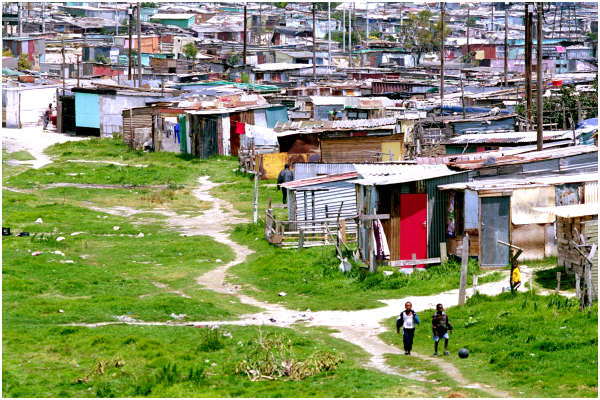Affordable Housing
 This is what housing in many parts of South Africa looks like - tin shanties knocked together with whatever's lying around, from cardboard to wood to zinc sheeting. (image from here) It's a HUGE problem, especially for the government - who keep promising "affordable housing" for all - and end up producing little boxes of cement-brick and tin living space. All looking the same, all on bare dust-swept ground, not much better than the shacks and many of them poorly-built.
This is what housing in many parts of South Africa looks like - tin shanties knocked together with whatever's lying around, from cardboard to wood to zinc sheeting. (image from here) It's a HUGE problem, especially for the government - who keep promising "affordable housing" for all - and end up producing little boxes of cement-brick and tin living space. All looking the same, all on bare dust-swept ground, not much better than the shacks and many of them poorly-built.I know a couple of friends of mine who are builders, who have offered their workers the leftover supplies from a project to go build a proper house for themselves. These guys have the skills to do so, but refuse the offer - building a permanent dwelling will incur taxes, so they make do with a shack that leaks and floods and doesn't have an inch of insulation, one among thousands (millions?) of others.
But hey, government - here's a solution to your housing issues! Well, actually a couple of them, as well as a free idea to decrease certain types of land-fill thrown in for good measure.
Firstly - butt-kick the guys who are pocketing the millions you set aside in your election promises. Get rid of them, FIRE them (don't re-assign them to another department), hire folk from the needy areas to oversee building in their community. (Another free idea to cut unemployment!)
And then look at your options.
You're paying millions for labour and materials that are sub-standard and put together slap-dash. There are other ways and other materials to use.
Ever heard of slip-form masonry? Throw a foundation, then use moulds to pile up stones, fill the between-stone bits with cement, let sit a few hours, then move the moulds and do it all again. If the woman in the linked article can do it - ALONE - than surely your "workers" can get it right? Then again, maybe not. I see more of them sleeping next to the side of the road than actually working... except when the supervisor stops by, at which point frantic activity takes place!
If the workers aren't working, hand it over to the potential home owner. Give them a plot and a plan, a little instruction, a bag or two of cement and let them at it. And for goodness sake, don't try to dictate with arb construction laws how it has to look, exactly. Let them decide what they need, and how it should be laid out.
Ah, I hear you say - but we have no stones here, it's all just million-year-old beach sand from when this area was flooded by the sea!
But there, dear government, I have a solution too! Remember all those old buildings you bashed down, and all that rubble (bricks and cement) you piled into the landfills? Now, picture each clump of rubble as a stone - fill up those wall moulds with rubble, add your cement, and away you go! Just leave out the rubbish - hey, sorting rubble can be a whole new employment option...
See? Not that difficult - and it even looks good once it's done. It's unlikely to flood or be blown away by the winter winds, and you sure as heck can't burn it down easily (solving the fire-hazard problem of the current "accommodation" which kills hundreds every year)!
Not convinced? Well then there's always straw-bale building. But I realize your space is limited, land is in high demand - and straw bales do tend to make for thicker walls than the norm. Also, I suspect not much straw grows around here.
There's the sand-bag version - you WERE complaining of all sand and no stones a few paragraphs back, weren't you?
And you know all those papers blowing around in the veld? Well - use them in papercrete and get rid of them once and for all, will ya? Apparently not even the recycling companies have enough demand for them to accept our leftover papers, so here's where you can source them from.
(While you're at it - how about turning those plastic bags into something useful too?)
See? There's LOTS of affordable housing out there, dear government, if you would only get stuck into research, REALLY look at the alternatives to what you've been doing (hasn't worked, has it?) and actually START.
Let me know if I can help!
